
MAJESTIC MOUNT OLYMPUS
HOME OF THE OLYMPIAN GODS
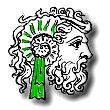
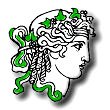

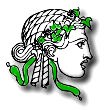

| The deities who did not live on Olympus, such
as the gods of the Underworld, the earth or the sea, would
arrive when summoned by Zeus. Zeus and Hera's thrones faced down the Council Hall towards the door leading into the open courtyard. Along the sides of the hall stood ten other thrones, five on each side, each one belonging to the other ten main Olympians. |
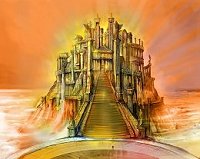 CLICK TO ENLARGE |
| Zeus held court at Olympus seated on an enormous throne of polished black Egyptian marble, adorned with gold. Each of the seven steps leading up to it were enameled with one of the colors of the rainbow. A bright blue covering above symbolized that the whole sky belonged to Zeus alone. |
 CLICK TO ENLARGE |
| Homer says that no wind ever shakes the untroubled peace of Olympus; no rain ever falls there or snow; but the cloudless firmament stretches around it on all sides and the white glory of sunshine is diffused upon its walls. |
It is written that Zeus talks to the gods from "the topmost peak of many-ridged Olympus," and only a little later he says that if he willed he could hang the earth and sea from a pinnacle of Olympus, clearly not a mountain. In either case, Olympus is not the equivalent of heaven. According to the writer Homer, Poseidon says that he rules the sea, Hades the dead, Zeus the heavens, but Olympus is common to all three.
The entrance to Olympus was a great gate of clouds, kept by the Seasons. Within were the gods’ dwellings where they lived and slept and held court. In its great halls they feasted on ambrosia and nectar and were entertained by Apollo’s lyre, the Graces and the Muses.
Nectar was a sweet drink made from fermented honey, and ambrosia was said to be an uncooked mixture of honey, water, fruit, olive oil, cheese and barley, disgusting as that sounds...
Others claim that a specie of speckled mushrooms were the true food of the Olympians, created whenever Zeus' thunderbolts struck the earth, and that this was what kept them immortal. The Olympians were fond of the smell of roast beef and mutton, but didn't like the taste, so mortals would sacrifice sheep and cattle to them, but afterwards would eat the meat themselves.
The deities who did not live on Olympus, such as the gods of the Underworld, the earth or the sea, would arrive when summoned by Zeus.
The builders of the palace at Olympus were the Cyclopes, gigantic one-eyed Titans who were freed by Zeus from Tartarus and in thanks gave him his famous thunderbolts. Hephaestus, the talented god of the smiths and the forge created all the furnishings and artwork on Olympus, even making some of the chairs and tables able to move themselves in and out of the celestial hall.
The private quarters of King Zeus and his wife Hera were located at the southern end of Olympus and overlooked the famous Greek cities of Athens, Thebes, Sparta, Corinth, Argos and Mycanae. At the northern end of the palace, facing the wild hills of Macedonia, were found the kitchen, banquet hall, armory, workshops and the servants' quarters.
In between was a square court, open to the sky, with private rooms on either side belonging to the other five Olympian gods and five Olympian goddesses. Past the kitchen and servants' quarters were situated cottages for lesser gods, as well as the stables, chariot sheds, dog kennels and the Olympians' private zoo, where the deities kept their sacred animals.
Zeus held court at Olympus seated on an enormous throne of polished black Egyptian marble, adorned with gold. Each of the seven steps leading up to it were enameled with one of the colors of the rainbow. A bright blue covering above symbolized that the whole sky belonged to Zeus alone. A ruby-eyed golden eagle perched on the right arm of his throne and a purple ram's fleece covered the cold seat. Zeus used this fleece for magical rainmaking in times of drought.
Queen Hera's throne was made of ivory, with three crystal steps leading up to it. Willow leaves and golden cuckoos decorated the back, and a full moon hung above it. Hera's seat cushion was a white cow skin, which she used to make rain when Zeus was too busy or couldn't be bothered to end droughts.
Zeus and Hera's thrones faced down the Council Hall towards the door leading into the open courtyard. Along the sides of the hall stood ten other thrones, five on each side, each one belonging to the other ten main Olympians.
Homer says that no wind ever shakes the untroubled peace of Olympus; no rain ever falls there or snow; but the cloudless firmament stretches around it on all sides and the white glory of sunshine is diffused upon its walls.
More Terrific Information from
THOMAS BULLFINCH'S
The Age of Fable
The abode of the gods was on the
summit of Mount Olympus, in Thessaly. A gate of clouds, kept by the
goddesses named the Seasons, opened to permit the passage of the
Celestials to earth, and to receive them on their return. The gods had
their separate dwellings; but all, when summoned, repaired to the palace
of Jupiter, as did also those deities whose usual abode was the earth,
the waters, or the under-world.
It was also in the great hall of the palace of the Olympian king that
the gods feasted each day on ambrosia and nectar, their food and drink,
the latter being handed round by the lovely goddess Hebe. Here they
conversed of the affairs of heaven and earth; and as they quaffed their
nectar, Apollo, the god of music, delighted them with the tones of his
lyre, to which the Muses sang in responsive strains. When the sun was
set, the gods retired to sleep in their respective dwellings.
The following lines from the "Odyssey" will
show how Homer conceived of Olympus:
"So saying, Minerva, goddess azure-eyed,
Rose to Olympus, the reputed seat
Eternal of the gods, which never storms
Disturb, rains drench, or snow invades, but calm
The expanse and cloudless shines with purest day.
There the inhabitants divine rejoice
For ever." (Cowper)
The robes and other parts of the dress of the goddesses were woven by
Minerva (Athena) and the Graces, and everything of a more solid nature
was formed of the various metals. Vulcan (Hephaestus) was architect,
smith, armourer, chariot builder, and artist of all work in Olympus.
He built of brass the houses of the gods; he made for them the golden
shoes with which they trod the air or the water, and moved from place to
place with the speed of the wind, or even of thought. He also shod with
brass the celestial steeds, which whirled the chariots of the gods
through the air, or along the surface of the sea. He was able to bestow
on his workmanship self-motion, so that the tripods (chairs and tables)
could move of themselves in and out of the celestial hall. He even
endowed with intelligence the golden handmaidens whom he made to wait on
himself.
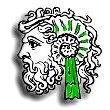
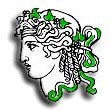
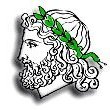
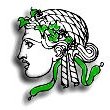
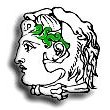
| Olympus was the residence of the divine family, the twelve most important ruling gods and goddesses of ancient Greece, who therefore were called the Olympians. There they all lived together in an enormous palace, high above the clouds. |
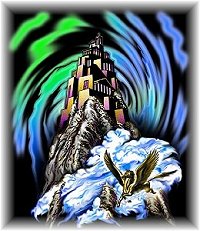 CLICK TO ENLARGE |
|
The entrance to Olympus was a great gate of clouds,
kept by the Seasons. Within were the gods’ dwellings where they
lived and slept and held court. The builders of the palace at Olympus were the Cyclopes, gigantic one-eyed Titans who were freed by Zeus from Tartarus and in thanks gave him his famous thunderbolts. |
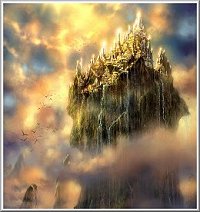 CLICK TO ENLARGE |
| It was also in the great hall of the palace of the Olympian king that the gods feasted each day on ambrosia and nectar, their food and drink, the latter being handed round by the lovely goddess Hebe |
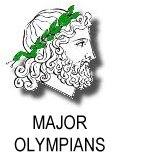

[HOME] [MYTHOLOGY'S
EFFECTS ON MODERN SOCIETY][OLYMPIANS]